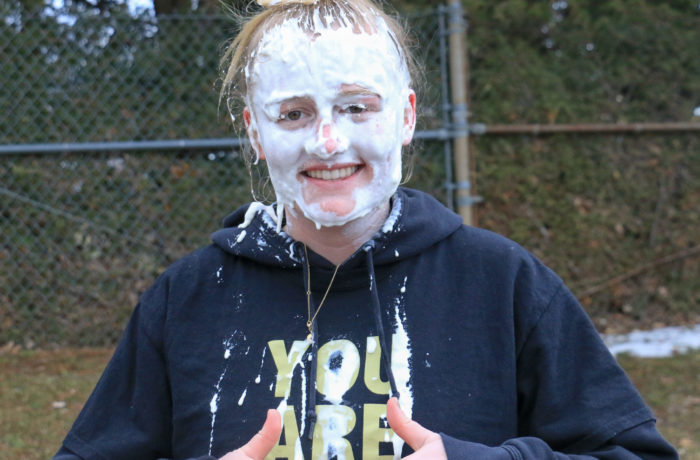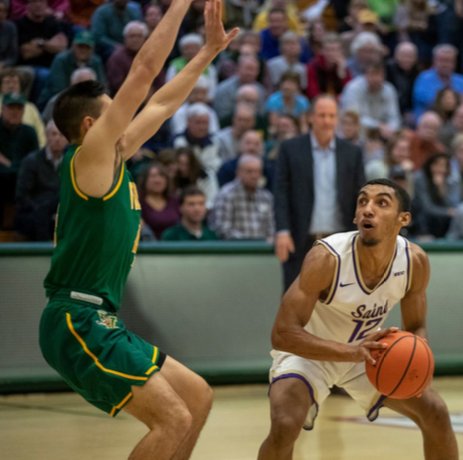Laurenn Dedecko ’19 quit her sport due to the agonizing amount of time she has to put into lacrosse. “On days we would have 6 a.m. practice I would have to make sure I was in bed early and make sure I had got all of my stuff done for the day of and the day after,” said Dedecko. After feeling there was not much of an incentive for her to keep playing, Dedecko felt that it was time to stop making herself suffer. The pressure to keep up with athletics and academics was the breaking point for her.
“21 sports, 1 team” is the motto for the St. Michael’s College Athletic Department. With approximately 400 students participating on a varsity team each year, Chris Kenny, head of the Athletic Department “great life tools are developed being a student-athlete,” said. But, at what point is the line drawn for athletes to balance their sport(s), academics, and a social life?
Playing a sport in college at the Division II level is a whole new ball game. You wake up at 5 a.m. to condition for an hour, if you are lucky squeeze in breakfast, then head to classes all day. Then, you find yourself running to Alliot to get lunch because you are already late for your treatment appointment at the trainers, followed by practice for two hours. Eventually you find yourself in the library searching for any left over energy to study for your exam tomorrow. The clock says 11:30 p.m. and you are still doing a homework assignment to only realize you have to wake up tomorrow and do it all over again.

Nicole Adach, a mental skills and performance coach, said that being an athlete is very black and white. St. Michael’s College is not scholarship based for most teams, but students are still being asked to give a lot. A common question from athletes is, “What is the reward? We aren’t winning, we aren’t on scholarships, there is no point,” Adach said.
From a young age athletes are constantly told in the sports culture “give your all or you aren’t going to be that great,” Adach said. Being an athlete is a huge part of one’s identity. The ongoing struggle of “everyone asking you to give 100 percent but no one has 500 percent to give” is something that Adach said is mentally the toughest thing athletes deal with daily.
Megan Robinson ’19 quit the women’s soccer team the summer before her senior year. Robinson came to the conclusion when she began to think about all of the things she could be spending her time doing such as school work, time with friends, applying for jobs, or just finding time for herself. “My overall health has been much better after quitting. A big weight was lifted off my shoulders which was good for me physically, mentally, and emotionally,” Robinson said.
Robinson has been dealing with Crohn’s Disease for the past five years. Stress is a big trigger for the disease and eventually Robinson had reached a point where she would physically react negatively to things and just did not enjoy playing anymore. “In the grand scheme of things I feel as though I made the best decision for me, not anyone else.”
Athletes struggle making decisions for themselves and not for others. The fear of disappointing a teammate or coach is a hard pill to swallow. “At a certain point you have to ask yourself is this really worth it? At first I cared what people thought of me, but then I was proud for sticking up for myself and taking the courage to know that I deserve better” Robinson said.
Conor DiNatale ’19, who quit men’s lacrosse his sophomore year, had a difficult decision to make. DiNatale knew he would miss the atmosphere of being on a team and being around everyone before and after practice, but he said since quitting his life has changed for the better. His grades have improved and now he is able to spend more time doing what he likes, such as skiing with friends. DiNatale never questioned if he would lose touch with his teammates. He currently lives with three current lacrosse players and another former player.
The overpowering amounts of stress between practice and school work also led Holden Jackman ’21 to quit the baseball team before his sophomore year.
“School is way easier when you do not have to miss a lot of classes due to games.” Jackman said. Jackman knew he would still be friends with the team if he quit and they would understand his reasoning, but he struggled with is what his parents would say. “I was terrified to quit because I thought my dad was going to hate me,” he said.
Mental skills coach, Nicole Adach, uses the analogy of a cup to students who come to her when dealing with stress. Picture everything that is stressful filling up your cup a little bit: your social life, arguments with friends, being in a relationship, academics, or making sure you’re not letting your parents down. Then add in a sport or another obligation, this pours more stress into your cup. Athletes eventually get to a point where they can not take anymore stress. Not to mention everyone is different, therefore their glasses differ in size for how much stress they can handle. “We aren’t paying attention to how close we are to the edge, and then it overflows and you get burned,” Adach said.
Although being a college athlete seems to go hand in hand with stress, Chris Kenny, head of athletics, said quitting is one of the many issues that athletes face in college when trying to be successful.
“Here at Saint Mike’s, our student athletes are really fortunate, and we are very fortunate as an administrative team too, to be working at such a collaborative school where Dean D’Amore and so many others are right there to assist and offer great academic support and opportunities to help our athletes.”
Kenny emphasized that it is hard for student-athletes to slip through the cracks here without their struggles being noticed. When a student is feeling pressure from athletics and academics it is vital that they voice it.
“It is really important for [students] to communicate that as soon as possible because there is an immediate support system that goes into play to help them be successful academically and athletically,” Kenny said.



